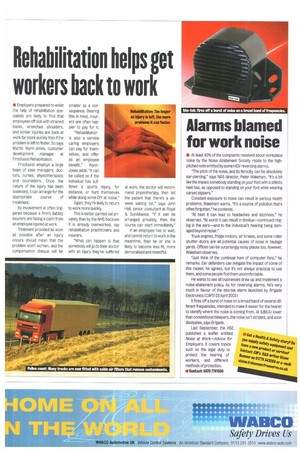Alarms blamed for work noise
Page 27

If you've noticed an error in this article please click here to report it so we can fix it.
II At least 80% of the complaints received about workplace noise by the Noise Abatement Society relate to the highpitched note emitted by some HGV reversing alarms.
"The pitch of the noise, and its ferocity, can be absolutely ear-piercing," says NAS director, Peter Wakeham. "It's a bit like the impact somebody standing on your foot with a stiletto heel has, as opposed to standing on your foot while wearing carpet slippers."
Constant exposure to noise can result in serious health problems, Wakeham warns. It's a source of pollution that's often forgotten," he contends.
"At best it can lead to headaches and dizziness," he observes. "At worst it can result in tinnitus—continued ringing in the ears—and to the individual's hearing being damaged beyond repair."
Truck engines, fridge motors, air brakes, and some roller shutter doors are all potential causes of noise in haulage yards. Offices can be surprisingly noisy places too, however, Wakeham observes.
"Just think of the continual hum of computer fans," he remarks. Ear defenders can mitigate the impact of some of this racket, he agrees, but it's not always practical to use them, and some people find them uncomfortable.
He wants to see all businesses draw up and implement a noise-abatement policy. As for reversing alarms, he's very much in favour of the bbs-tek alarm launched by Brigade Electronics (C M17-23 April 2003).
It fires off a burst of noise on a broad band of several different frequencies, intended to make it easier for the hearer to identify where the noise is coming from. At 5dB(A) lower than conventional bleepers, the noise isn't strident, and soon dissipates, says Brigade.
Last September, the HSE
published a leaflet entitled Noise at Work—Advice for Employers. It covers topics such as the legal duty to protect the hearing of workers, and different methods of protection.
• Contact WHO 7/41500














































































































































































